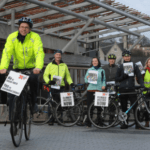 By Mike Robinson, board member of Stop Climate Chaos Scotland
By Mike Robinson, board member of Stop Climate Chaos Scotland
After the UN climate talks in Paris, countries around the world were presented with a challenge: how will they deliver on the climate promises they have made? What actions will follow the words?
Stop Climate Chaos Scotland wants all political parties in Scotland to clearly show their commitment to climate action. And for us, that must include using Holyrood’s new powers on Air Passenger Duty (APD) as a financial incentive to reduce overall climate emissions from air travel.
Air Passenger Duty is an excise duty that passengers pay when they travel on commercial aircraft with more than 20 seats. People travelling in the lowest class seats, for less than 2000 miles, pay £13. Those in the most expensive seats, travelling for more than 2000 miles, can pay up to £142.
At the moment, the SNP-led Scottish Government has committed to begin to reduce APD by 50% in the next Parliament. I am a member of the Government’s APD Forum, involving a number of airline and airport representatives and tax experts. And I’m more convinced than ever that cutting APD is unaffordable.
Of all the kinds of journey that we can make, air travel is the highest emitter of carbon per passenger kilometre, especially for domestic flights. And it is the only sector where emissions have risen significantly over the past 20 years.
According to the Civil Aviation Authority, in 2014 the number of terminal passengers was at its equal highest level ever – around 240 million passengers per year. Commercial flights, while down 10% on 2006 levels, are still 25% higher than they were in 1994 – the year when APD was introduced.
The Scottish Government says that APD is a barrier to Scotland’s ability to secure new direct air routes and maintain existing ones.
Short term there might be a slight advantage to Scotland having cheaper APD than England and Wales, generating a burst of extra business at the expense of Newcastle, Manchester and other regional airports, but it is difficult to see this lasting any length of time, and in fact the airline industry is in large part opposed to this differential charging within the UK.
According to the Scottish Government’s analysis of the effect of cutting APD by 50%, more than half of the annual passenger increase would come from passengers flying within the UK, at the expense of train travel – a far more sustainable mode of transport. Over half of the UK public do not fly in any given year. Yet for most people, train fares have been rising – three times as fast as wages for some tickets – while the cost of air travel has been reduced.
Airfares are not subject to VAT and aviation fuel is tax-free. Rail travel does not enjoy all of these privileges. As a result, it is difficult for train ticket prices to compete with the equivalent air miles. This is in spite of rail travel being a lower carbon form of transport, used by a wider section of the population.
And, of course, a cut in APD also ignores the big issue: the Scottish Government’s own analysis shows that a 50% cut in APD could increase CO2 emissions by up to 60,000 tonnes. We simply can’t afford that, especially when Scotland last year failed to meet its fourth annual climate target in a row.
And another huge issue is the tax revenue. Can we really afford to give up any of the £230 million of tax that current APD would generate for the Scottish Government when devolved? Deciding during a period of austerity to simply give up a significant chunk of tax revenue in the hope that it might generate more indirect income is a big gamble.
The income from APD should be safeguarded, and used to match the ambition and enthusiasm of communities all over Scotland who want to move to a thriving, fairer, low carbon economy.
That’s what Stop Climate Chaos Scotland is calling for in its manifesto for the Scottish Parliament elections. We want all political parties to work towards a low carbon Scotland for 2020.
The position of political parties on Air Passenger Duty is a measure of their commitment to real action on climate change: they must meet the challenge set by the Paris climate talks, and the demands of thousands of concerned citizens for a better Scotland, and a better world.



